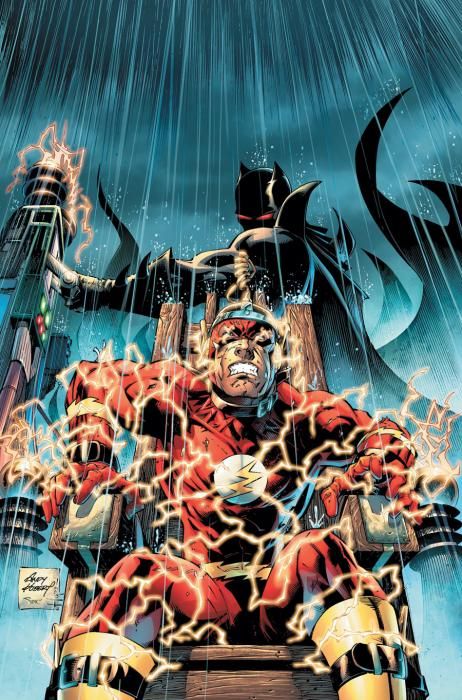Putting aside all of the recent post-"Flashpoint" announcements for the DC Universe (and I know it's difficult to ignore that elephant in the corner), reading "Flashpoint" #2 has a large, fundamental problem at its core: it's hard to care about what happens here.
Geoff Johns tries his hardest to rev up the reader. Halfway through the issue, Barry Allen tells Batman, "This isn't a parallel Earth or a mirror world... this is home. It's real." He might as well have turned directly to the readers and addressed them with that line, trying to hammer home that this isn't just another "trapped in a different world" story.
But at the very heart of "Flashpoint" is the underlying fact that this is a story where time travel was responsible for the unraveling and remaking of the DC Universe. And of course, what can be altered through time travel can just as easily be altered again, body count be damned. In short, it doesn't particularly matter what happens in "Flashpoint" because-even before the news broke that the DC Universe is getting rebooted again-we all knew that the world of "Flashpoint" would not survive and that everything would be different. This is a universe where time travel caused some people to die early and others to still be alive; time travel will no doubt do the same to any characters that are killed in its pages.
Or to put it another way, by making the changes in "Flashpoint" so huge and sweeping (Half of the UK dead! France destroyed! Atlantis at war with the Amazons! Gorilla City taking over half of Africa!), Johns has destroyed any inkling that even pieces of this might survive. Compare it to Johns' first story about Wally West, "Wonderland" (included in the "Geoff Johns Flash Omnibus" just released) where Wally is plunged into an alternate world. But because the stakes are much smaller-only he is trapped there, not the entire universe of characters-there's tension, there's excitement, and overall it works much better than this.
So what do we get with "Flashpoint" #2? A surprising amount of talking, above all else. I appreciate that Johns is trying to sell this changed world, but at the same time it's remarkably light on action, or tension. There are a couple of nice surprises (what's waiting for Barry inside the Flash ring, or our brief glimpse into New Themyscira) but all in all it's a slow-moving, slightly leaden story.
The high point is Andy Kubert and Sandra Hope's art. Kubert's been reportedly working on this for a year now, and getting the additional time results in some gorgeous moments. Our glimpse of the ruins of Paris is fantastic, with the tilted, ruined Eiffel Tower having a great impact thanks to all of the detail in both its structure as well as the clouds and smoke surrounding it. Using the Eiffel Tower sounds like a visual cliche, but its iconic nature works well here because of Kubert's hard work. Even then, there are some pages which seem a little cluttered and messy, like Wonder Woman's attack on the spy in her country. He's definitely best at the big, beautiful moments; as the panels shrink in size, so does a lot of the impact from Kubert's contributions overall.
"Flashpoint" is going to end up being a curious footnote in DC Comics history. If it wasn't for September's reboot, I have a feeling that it would turn out to be a crossover that was largely forgotten like, say, "Genesis" or "Final Night." Now, it's going to serve as the end of an era. Sadly, it's heading more towards a whimper than a bang.

